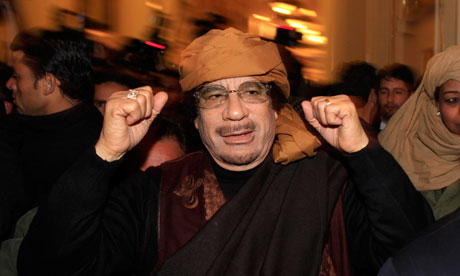Gaddafi's letter to Obama
 Obama should answer his letter and call his bluff. Photograph: Ahmed Jadallah/Reuters
Obama should answer his letter and call his bluff. Photograph: Ahmed Jadallah/Reuters
The American right will undoubtedly have a lot of fun with the way Gaddafi opens his letter to Obama:
"To our son, his excellency, Mr Barack Hussein Obama. I have said to you before, that even if Libya and the United States of America enter into a war, god forbid, you will always remain a son. Your picture will not be changed."
Aw that's sweet. It reflects nothing except the chemical confrontations taking place in Gaddafi's mind, but let them have their sport with it.
The other part of the letter, however, is more intriguing:
"Al-Qaida is an armed organisation, passing through Algeria, Mauritania and Mali. What would you do if you found them controlling American cities with the power of weapons? What would you do, so I can follow your example."
Obama should call his bluff and answer the letter, saying, well, your excellency, here is what I would do. First of all, I would not have presided over a closed and repressive society without democracy for 40 years. I'd have elections. If I were voted out, I'd go, peacefully. I'd have a free press. You may have noticed that my political opponents say some rough things about me. That's how it works in a mature society.
Here's what our State Department says about your government:
The government's human rights record remained poor. Citizens did not have the right to change their government. Continuing problems included reported disappearances; torture; arbitrary arrest; lengthy pretrial and sometimes incommunicado detention; official impunity; and poor prison conditions. Denial of fair public trial by an independent judiciary, political prisoners and detainees, and the lack of judicial recourse for alleged human rights violations were also problems. The government instituted new restrictions on media freedom and continued to restrict freedom of speech (including Internet and academic freedom). It continued to impede the freedom of assembly, freedom of association, and civil liberties. The government did not fully protect the rights of migrants, asylum seekers, and refugees, and in some cases participated in their abuse. Other problems included restrictions on freedom of religion; corruption and lack of transparency; discrimination against women, ethnic minorities, and foreign workers; trafficking in persons; and restriction of labor rights.
Now I know you will dispute these matters, but many independent international observers say the same thing. So I'll tell you what, dude. You change those conditions, we'll call the whole thing off.
Won't happen; would be awesome. Okay, I'm traveling early part of next week. I will do a little posting, so do check in.
No comments:
Post a Comment